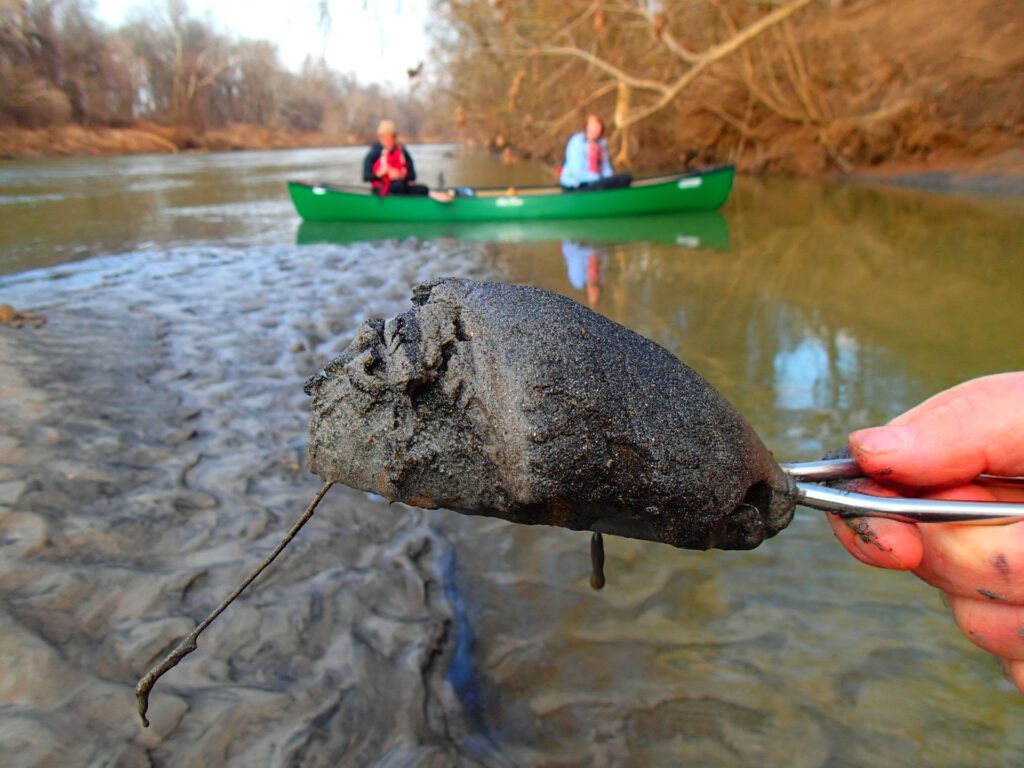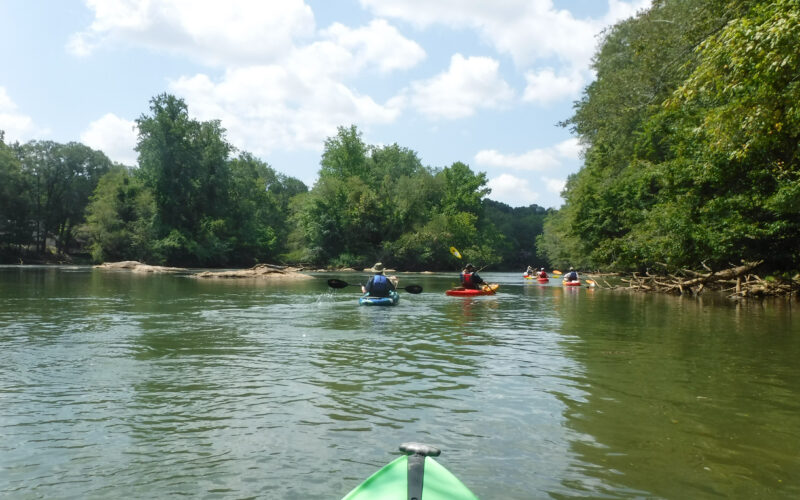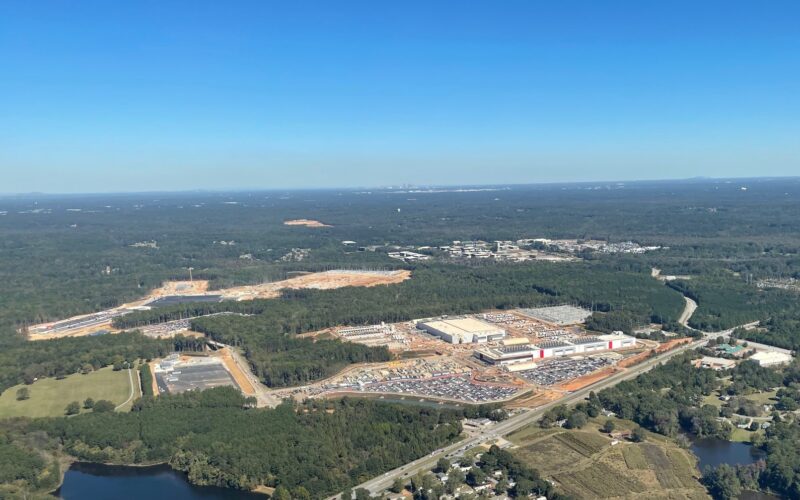We’re not going to sugarcoat it – this was not a successful year for legislation to protect Georgia’s natural resources.
CRK is a founding member and active leader of the Georgia Water Coalition, a network of clean water advocates that team up to encourage legislation that protects our water and property rights at the Capitol every year during the legislative session. The GWC team worked day in and day out to advance our priorities and stop rollbacks that would harm our waterways and infringe on Georgians’ property rights, but there remains a steadfast stubbornness on the part of our General Assembly to take meaningful action to protect the environment.
Each year, the GWC membership adopts two or three priority issues addressing critical threats to Georgia’s waterways. This year, we focused on securing adequate disposal plans for toxic coal ash and protecting the Okefenokee Swamp from harmful mining on adjacent lands.
Safe Coal Ash Disposal
Photo courtesy of Dan River Basin Association
Coal ash is the toxic waste left behind from coal-burning energy production, which contains dangerous heavy metals. Georgia Power is currently pursuing plans to permanently leave approximately 45 million tons of this waste mixed with groundwater in unlined pits along the Coosa, Chattahoochee, and Ocmulgee rivers. This is of critical importance to Georgians in the Chattahoochee River watershed, because approximately 30 tons of that toxic waste will be left in unlined pits at three power plants along the Chattahoochee. These pits – in Cobb, Coweta, and Heard counties – leave coal ash mingling with groundwater along the river and create significant risks of surface and groundwater contamination that could impact drinking water supplies.
In January, the U.S. Environmental Protection Agency referenced the unsafe storage of toxic coal ash in Georgia. The agency clarified that federal law does not allow the disposal of coal ash in groundwater, but Georgia’s own laws must be fixed to ensure safer storage of coal ash.
HB 176 (sponsored by Rep. Debbie Buckner, D-Junction City, Mary Margaret Oliver, Mary Frances Williams, and others) and SB 230 (sponsored by Sen. Jen Jordan, D-Atlanta, and others) would have required that coal ash be disposed of in lined, permitted solid waste landfills; but these bills never got hearings or any meaningful support from legislative leaders during the last two years.
HB 647 (sponsored by Rep. Vance Smith, R-Pine Mountain, and HNRE Chair Rep. Lynn Smith, R-Newnan) addressed post-closure groundwater monitoring at coal ash disposal sites. This bill would have at least provided better monitoring of this waste stream that is mingling in groundwater for generations to come; but even this legislation failed to garner serious consideration in 2022.
Protect the Okefenokee Swamp
In early February, a bipartisan group of 18 legislators introduced HB 1289 to protect the Okefenokee Swamp and surrounding ecosystem from mining that could cause lasting and irreversible negative impacts to the swamp, its wildlife, regional ecotourism, and adjacent timberlands. We are grateful to sponsors Rep. Darlene Taylor (R, District 173- Thomasville) and Rep. Ron Stephens (R, District 164-Savannah) for leading this effort. Despite unanimous support from Southeast Georgia legislators and broad support statewide, the bill languished in the House and did not pass.
The Okefenokee is the wild heart of Georgia. Heavy mineral mining on adjacent lands would destroy wetlands that are connected to the swamp, and therefore would likely lead to degradation of the swamp’s unique and untamed ecosystems. The mining company’s permit applications are currently stalled under Georgia Environmental Protection Division’s review, but we need new laws to protect this world-renowned resource.
Rollbacks
Each year, GWC fights against rollbacks, bills that would weaken environmental protections. This year, a particularly bad bill passed that will weaken longstanding protections for rural Georgia property owners.
HB 1150 (Rep. Dickey, R-Musella), which passed through both chambers on the final day of legislative session, strips existing right-to-farm protections and flips the balance of protections from long-time rural Georgia landowners to new-coming industrial corporate agriculture operations. The bill is a signal to large-scale poultry and dairy operations that they can proliferate in Georgia, and long-time nearby residents will have far less recourse should the new operations cause harmful environmental impacts to their neighboring properties. It also exposes existing farmers to nuisance actions they were previously shielded from.
The bill’s major proponents – Georgia Poultry Federation and Georgia Farm Bureau – have put at risk the property rights and values of many of their longest-tenured farmers across the state. Hopefully, impacts from HB 1150 will be minimal, but the path has been paved for significant environmental degradation and property devaluation with little recourse to those in position to most feel the impacts.
Other Legislation
In 2020 and 2021, the GWC celebrated a victory more than a decade in the making, when it passed a constitutional referendum and attendant legislation that ensured fees collected for important environmental trust funds can be allocated to specific funds as originally intended. For decades, the General Assembly had discretion to essentially misappropriate fees collected under the guise of environmental protection into the state’s general fund, treating them as taxes instead of as funds earmarked for specific uses. This led to hundreds of millions of dollars being siphoned out of trust funds that, if fully funded, could have cleaned up scrap tire dumps, addressed issues at landfills, and remediated hazardous waste sites that blight Georgia communities.
HB 893 (Rep. Nix, R-Lagrange) passed, extending the collection of fees paid into Hazardous Waste Trust Fund through 2032. However, it was discovered that some of the fees collected are still not being directed to the trust fund, due to some errors in the 2021 legislation that established dedication of the fees. Legislation was introduced this year to dedicate these fees and ensure that every dollar collected will be dedicated to the trust funds. Unfortunately, HB 1421 (Rep. Buckner, D-Junction City) failed on the final day of the session. This bill would have completed the dedication of these fees to the trust funds, ending the years of misappropriation by the General Assembly. The effort to close this loophole must continue until it is fixed.
CRK and its partners will enjoy a brief break from the grind of the legislative session, and then soon reconvene to set next year’s priorities and continue this vital work to advocate for stronger laws for the Chattahoochee and all of Georgia’s water resources.
We are grateful to everyone who acted and spoke to your elected officials. Your advocacy remains as important as ever. If you have not already, sign up for Protect Georgia alerts to be informed of opportunities to speak up for Georgia’s water resources throughout the year.



